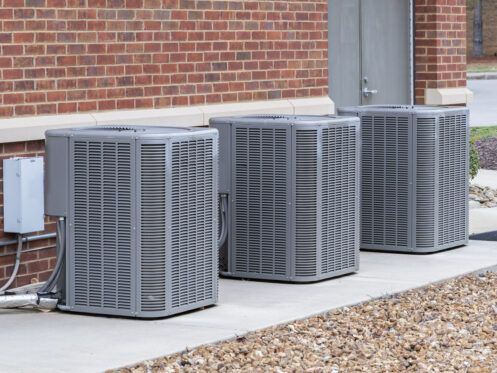In the quest for sustainable and efficient home cooling methods, geothermal energy has recently gained attention as an alternative to traditional air conditioning systems. Geothermal cooling taps into the Earth’s natural energy to regulate your home’s temperature. However, before you invest in geothermal cooling, here is what you need to know.
Understanding Geothermal Cooling
Geothermal cooling, also known as a ground source heat pump, uses the Earth’s constant temperature to transfer heat. It operates on the same principle as geothermal heating but flips the mechanism to expel heat from the home into the relatively cooler Earth.
How It Works
The Earth’s temperature just a few feet below the surface remains relatively constant (ranges from around 45 to 75 degrees Fahrenheit) throughout the year, regardless of the season. Geothermal cooling systems harness this stable temperature by exchanging heat with the Earth through underground pipes. The parts that play a pivotal role in this process include the heat exchange loop, ground source heat pump (GSHP), and air distribution system.
The heat exchange loop is filled with a water-antifreeze solution that runs underground, absorbing heat from the surrounding environment. The solution circulates through a ground-source heat pump (GSHP) located inside your home. The GSHP contains a compressor, condenser, and evaporator. As the water-antifreeze solution passes through the GSHP, it transfers its heat to the refrigerant in the system.
The refrigerant then gets compressed, which causes it to become warm and move into the condenser, where it releases its heat into the home’s air distribution system. Finally, the cooled air is distributed throughout the house via a fan and ductwork while the refrigerant returns to its liquid state and repeats the process.
Variations in Geothermal Systems
What are the variations in geothermal systems, you might ask.
Horizontal Loop System
A horizontal loop system involves burying pipes horizontally just below the ground’s surface. It’s a common choice for areas with plenty of land space.
Vertical Loop System
This system is ideal for properties with limited space for horizontal trenches. Vertical loops involve drilling one or more boreholes deep underground, typically hundreds of feet deep. Pipes are inserted into the boreholes, and the space between the pipes and the borehole walls is filled with grout material to enhance heat transfer.
Open Loop System
Open loop systems utilize groundwater or surface water sources like wells or lakes as the heat exchange medium. The water is circulated through the GSHP to extract heat and then returned to the ground source after cooling. It’s ideal for areas with readily available and sustainable sources of water and where ground conditions are favorable for water circulation.
Benefits of Geothermal Cooling
What are the benefits of geothermal cooling?
Energy Efficiency
Unlike traditional AC units that battle the rising outdoor temperature by using electricity to produce cool air, geothermal systems don’t need to generate coolness from scratch. They act as heat exchangers, utilizing the Earth’s constant underground temperature, which is typically cooler than the surrounding air during summer months. In simpler terms, the Earth acts as a giant pre-cooling system, reducing the workload for the ground source heat pump and minimizing energy consumption.
Reduced Carbon Footprint
The cornerstone of geothermal cooling’s environmental friendliness is its reliance on renewable energy. Geothermal systems tap into the Earth’s constant underground temperature, a naturally occurring and continuously replenished source of thermal energy. This eliminates the need for significant electricity consumption to achieve cooling, reducing dependence on fossil fuels and their associated greenhouse gas emissions.
Consistent Comfort
The Earth’s surface maintains a relatively stable temperature year-round, and this is reflected in geothermal cooling systems. Due to its use of the Earth’s heat exchange method, the system can maintain a consistent temperature within your home or building regardless of outdoor climate fluctuations. This results in improved indoor air quality and comfort for occupants.
Quiet Operation
Geothermal cooling systems operate silently compared to traditional air conditioning units with noisy outdoor condensers. This is because the majority of the system’s components are housed underground, minimizing noise pollution and making them ideal for residential areas or noise-sensitive environments such as schools or healthcare facilities.
Durability and Low Maintenance
Geothermal cooling systems have fewer moving parts than traditional AC units, resulting in less wear and tear and a longer lifespan. The indoor components are also sheltered from harsh outdoor elements, further increasing their durability. This translates to lower maintenance costs and less frequent replacements. With proper maintenance, your system can last up to 50 years.
Versatility
While most commonly used for cooling, geothermal systems can also provide heating during colder months by reversing the heat exchange process. Moreover, the underground piping can also be used to preheat water for domestic use, further reducing energy consumption and utility costs.
Potential Tax Credits
Due to their environmental benefits, geothermal cooling systems may qualify for tax credits, reducing the upfront cost and making them a more attractive investment. For example, under the Inflation Reduction Act of 2022, the federal government has extended tax incentives for homeowners looking to install renewable energy systems like geothermal heat pumps.
What to Consider Before You Invest in Geothermal Cooling
Does it make sense for you to buy a geothermal cooling system?
Upfront Costs
The initial expense of a geothermal cooling system can be significantly higher than a traditional air conditioning unit. Costs include the heat pump itself, the heat exchanger, and the labor to install the system. However, long-term energy savings and potential tax incentives offset these costs.
Property Suitability
Not all properties are ideal for geothermal systems. Taking your soil type, for instance, they each have varying thermal conductivity. Sand soils have higher conductivity, so they are able to transfer heat more efficiently. Clay soils, on the other hand, have lower conductivity and may require more underground piping.
As mentioned earlier, space can also influence the size and layout of the system. Limited space can necessitate a vertical loop system, which involves drilling hundreds of feet deep boreholes. This can add to the upfront costs.
Maintenance Requirements
Regular maintenance is necessary for geothermal cooling systems to continue operating efficiently. This includes checking and replacing filters, inspecting the piping system, and monitoring fluid levels. While these maintenance tasks may seem daunting, they are less frequent than traditional HVAC systems.
Installation Expertise
Choosing the right company to install your geothermal system is crucial. Level 9 Heating, Cooling, and Plumbing has certified and experienced installers who can manage the complex process from start to finish. We serve Washington, St. Louis, MO, and surrounding areas.
Geothermal Cooling and Building Codes
You can’t just install a geothermal system without considering local building codes and regulations. You must consult with your local authority to know the permits and requirements you must comply with before installing a geothermal system.
In addition to building codes, it is important to consider any potential zoning restrictions that may impact the installation of a geothermal system. Some areas may have specific regulations on drilling or the location of underground piping. Our experts at Level 9 Heating, Cooling, and Plumbing will help you with this process to ensure your system is installed in compliance with all regulations.
Is Geothermal Cooling Worth the Investment?
We also offer AC, heating, plumbing, and indoor air quality services. Additionally, we offer commercial HVAC services and 24/7 emergency repair services. Call Level 9 Heating, Cooling, and Plumbing today if you’re considering geothermal cooling, and we can install, repair, or maintain your new or current system.



